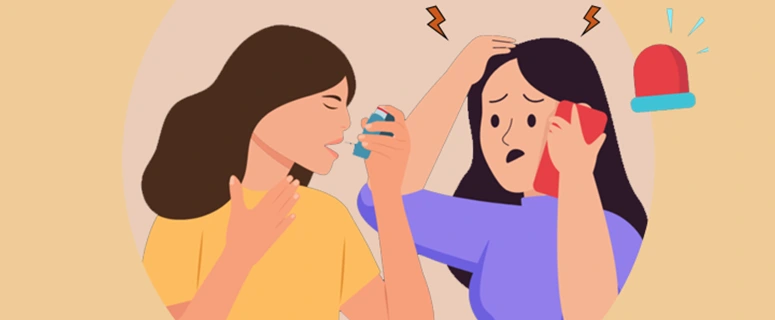Have you ever felt sudden chest tightness and struggled to breathe, wondering whether you’re having an asthma attack or panic attack? You’re not alone. These two conditions share remarkably similar symptoms, making them difficult to distinguish in the moment. However, understanding the key differences between asthma attack vs panic attack can be life-saving and help you get the right treatment fast.
While both conditions cause breathing difficulties and chest discomfort, they stem from completely different causes and require different approaches to treatment. Let’s explore everything you need to know about recognizing, treating, and managing both conditions.
What is an Asthma Attack?
An asthma attack occurs when your airways become inflamed, narrow, and fill with excess mucus, making it extremely difficult to breathe. During an attack, the muscles around your bronchial tubes tighten, further restricting airflow to your lungs.
According to the Centers for Disease Control and Prevention, asthma affects over 25 million Americans, including 5 million children. When an asthma attack strikes, it can range from mild discomfort to a life-threatening emergency requiring immediate medical attention.
Common Asthma Attack Triggers
Understanding your asthma triggers is crucial for prevention. Common triggers include:
- Environmental allergens: Pollen, dust mites, pet dander, mold
- Irritants: Cigarette smoke, strong perfumes, cleaning chemicals
- Weather conditions: Cold air, humidity changes, extreme temperatures
- Physical activity: Exercise-induced asthma, especially in cold weather
- Respiratory infections: Common cold, flu, sinus infections
- Emotional stress: Anxiety and overwhelming emotions
- Certain medications: Aspirin, beta-blockers
- Food allergies: Shellfish, nuts, sulfites in processed foods
Asthma Attack Symptoms to Watch For
Recognizing asthma attack symptoms early can help you take action before they become severe:
Primary symptoms:
- Wheezing (high-pitched whistling sound when breathing)
- Shortness of breath or difficulty breathing
- Chest tightness or pressure
- Persistent coughing, especially at night
Warning signs of severe asthma attack:
- Inability to speak in full sentences
- Bluish lips, face, or fingernails
- Rapid breathing (over 30 breaths per minute)
- Severe chest pain
- Extreme difficulty breathing even while sitting still
Emergency signs requiring immediate medical attention:
- Gasping for breath
- Inability to walk or talk due to breathlessness
- Lips or face turning blue or gray
- Severe anxiety due to inability to breathe
What is a Panic Attack?
A panic attack is an intense episode of fear or anxiety that triggers severe physical reactions, even when there’s no real danger present. During a panic attack, your body’s “fight-or-flight” response activates, causing a cascade of physical symptoms that can feel overwhelming and frightening.
According to the National Institute of Mental Health, panic attacks affect about 6 million American adults, with women being twice as likely to experience them as men. While panic attacks aren’t physically dangerous, they can be emotionally debilitating and significantly impact your quality of life.
Common Panic Attack Triggers
Panic attacks can occur unexpectedly, but common triggers include:
- Stress and anxiety: Work pressure, relationship problems, financial concerns
- Phobias: Fear of enclosed spaces, heights, flying, public speaking
- Major life changes: Moving, job loss, divorce, death of loved one
- Caffeine or stimulants: Excessive coffee, energy drinks, certain medications
- Medical conditions: Hyperthyroidism, heart problems, low blood sugar
- Substance withdrawal: Alcohol, drugs, certain medications
- Past traumatic experiences: PTSD, previous panic attacks
Panic Attack Symptoms: What to Expect
Panic attack symptoms typically peak within 10 minutes and can include:
Physical symptoms:
- Rapid, pounding heartbeat (palpitations)
- Sweating and hot or cold flashes
- Trembling or shaking
- Shortness of breath or feeling smothered
- Chest pain or discomfort
- Nausea or stomach upset
- Dizziness or lightheadedness
- Tingling or numbness in hands, feet, or face
Emotional and psychological symptoms:
- Intense fear of dying or losing control
- Feeling detached from reality or yourself
- Fear of “going crazy”
- Overwhelming sense of doom
- Feeling like you’re having a heart attack
Asthma Attack vs Panic Attack: Key Differences
While both conditions can cause breathing problems and chest discomfort, several important differences can help you distinguish between them:
Breathing Patterns
- Asthma attack: Airways physically constrict, reducing oxygen flow. Breathing is labored with audible wheezing
- Panic attack: Hyperventilation occurs, actually increasing oxygen levels. Breathing is rapid and shallow
Onset and Duration
- Asthma attack: Usually develops gradually over minutes to hours; can last from minutes to days if untreated
- Panic attack: Strikes suddenly and intensely; typically peaks within 10 minutes and subsides within 20-30 minutes
Sound and Breathing Quality
- Asthma attack: Distinct wheezing or whistling sound when breathing, especially on exhale
- Panic attack: No wheezing; may hear rapid, gasping breaths
Response to Treatment
- Asthma attack: Responds to bronchodilator inhalers and asthma medications
- Panic attack: Doesn’t respond to asthma medications; may improve with relaxation techniques
Additional Symptoms
- Asthma attack: Primarily respiratory symptoms, persistent cough, mucus production
- Panic attack: Multiple body systems affected – sweating, heart palpitations, nausea, psychological symptoms
Triggers
- Asthma attack: Physical/environmental triggers (allergens, exercise, cold air)
- Panic attack: Emotional/psychological triggers (stress, phobias, anxiety)
Can You Have Both at the Same Time?
Yes, it’s possible to experience both asthma and panic attacks simultaneously, and this combination can be particularly challenging to manage. Research from the Mayo Clinic shows that people with asthma are more likely to develop anxiety disorders, including panic disorder.
When both conditions occur together:
- Panic can trigger asthma symptoms (anxiety-induced asthma)
- Difficulty breathing from asthma can trigger panic attacks
- Symptoms become more severe and harder to treat
- It becomes crucial to treat both conditions for effective management
If you suspect you have both conditions, work closely with both a pulmonologist and mental health professional for comprehensive care.
Treatment Plans: Asthma Attack vs Panic Attack
Asthma Attack Treatment
Immediate treatment:
- Use your rescue inhaler (quick-relief bronchodilator) as prescribed
- Sit upright to help open airways
- Stay calm and breathe slowly
- Remove yourself from triggers if possible
- Seek emergency care if symptoms don’t improve within 15-20 minutes
Long-term asthma management:
- Controller medications: Long-acting bronchodilators, inhaled corticosteroids
- Anti-inflammatory drugs: Reduce airway inflammation
- Immunomodulators: For severe asthma, modify immune response to allergens
- Allergy medications: Antihistamines for allergen-triggered asthma
Asthma action plan essentials:
- Know your triggers and avoid them
- Take medications as prescribed
- Monitor peak flow readings
- Recognize early warning signs
- Know when to seek emergency care
Panic Attack Treatment
During a panic attack:
- Practice deep, slow breathing (4 counts in, 6 counts out)
- Use grounding techniques (5-4-3-2-1 method)
- Remind yourself the attack will pass
- Find a safe, quiet space
- Use relaxation techniques you’ve practiced
Long-term panic attack management:
- Medications: Anti-anxiety drugs (benzodiazepines), antidepressants (SSRIs), beta-blockers
- Cognitive Behavioral Therapy (CBT): Address negative thought patterns
- Exposure therapy: Gradually face feared situations
- Mindfulness and meditation: Reduce overall anxiety levels
- Lifestyle changes: Regular exercise, stress management, adequate sleep
When to Seek Emergency Medical Care
Asthma Emergency Signs:
- Severe breathing difficulty even while sitting still
- Cannot speak in full sentences
- Bluish color around lips, face, or fingernails
- Rescue inhaler doesn’t provide relief within 15-20 minutes
- Peak flow reading in red zone (if you use a peak flow meter)
Panic Attack Emergency Signs:
- Chest pain that feels different from previous panic attacks
- Symptoms lasting longer than 30 minutes
- First-time panic attack (to rule out other medical conditions)
- Thoughts of self-harm
Prevention Strategies
Preventing Asthma Attacks:
- Identify and avoid your specific triggers
- Take controller medications consistently as prescribed
- Get annual flu vaccines
- Maintain a healthy weight
- Create an asthma-friendly home environment
- Monitor air quality and pollen counts
- Manage stress effectively
Preventing Panic Attacks:
- Practice regular stress management techniques
- Maintain consistent sleep schedule
- Limit caffeine and alcohol intake
- Exercise regularly (but gradually if you have asthma)
- Build a strong support network
- Consider therapy for underlying anxiety issues
- Learn your early warning signs
Living with Both Conditions
If you have both asthma and panic disorder, coordination between your healthcare providers is essential. Your treatment plan should address:
- Managing anxiety that might trigger asthma symptoms
- Ensuring asthma medications don’t worsen anxiety
- Developing coping strategies for when both conditions interact
- Creating emergency action plans for both scenarios
- Regular monitoring and adjustment of treatment plans
The Bottom Line: Asthma Attack vs Panic Attack
While asthma attacks and panic attacks can feel frighteningly similar, understanding their differences empowers you to respond appropriately and seek the right treatment. Asthma attacks involve physical airway constriction requiring medical intervention, while panic attacks stem from intense anxiety and often respond to psychological techniques.
The key to managing either condition successfully lies in:
- Proper diagnosis from qualified healthcare professionals
- Understanding your personal triggers
- Having appropriate medications or coping strategies readily available
- Knowing when to seek emergency medical care
- Following a comprehensive management plan
Remember, both conditions are highly treatable with proper medical care and self-management strategies. If you’re experiencing symptoms of either condition, don’t hesitate to consult with healthcare professionals who can help you develop an effective treatment plan tailored to your specific needs. The American Academy of Allergy, Asthma & Immunology provides excellent resources for asthma management.
Whether you’re dealing with asthma, panic attacks, or both, you can live a full, active life with the right support and treatment approach.
Frequently Asked Questions
Can stress cause both asthma and panic attacks?
Yes, stress is a common trigger for both conditions. Chronic stress can worsen asthma symptoms by increasing inflammation in the airways, while acute stress can trigger panic attacks. Managing stress through relaxation techniques, regular exercise, and adequate sleep can help prevent both types of attacks.
How long do asthma attacks vs panic attacks typically last?
Asthma attacks can last anywhere from a few minutes to several days if left untreated, with symptoms gradually building up. Panic attacks typically peak within 10 minutes and usually subside within 20-30 minutes, though the emotional aftermath may last longer.
Can children experience both asthma and panic attacks?
Yes, children can experience both conditions. Childhood asthma is common, affecting about 1 in 12 children. Panic attacks in children are less common but can occur, especially in teens. If your child shows signs of either condition, consult a pediatrician for proper evaluation and treatment.
What should I do if I’m unsure whether it’s asthma or panic attack?
If you’re experiencing breathing difficulties and aren’t sure of the cause, treat it as a potential asthma attack first. Use your rescue inhaler if you have one, then try calming techniques. If symptoms don’t improve within 15-20 minutes or worsen, seek immediate medical attention. A healthcare provider can help determine the cause and adjust your treatment plan accordingly.
This article is for informational purposes only and does not substitute professional medical advice. Consult a qualified healthcare provider for personalized guidance.


